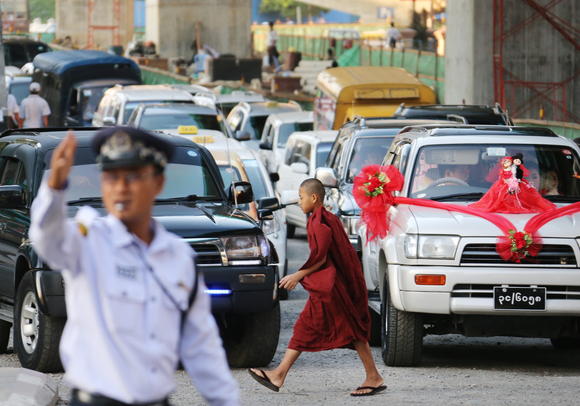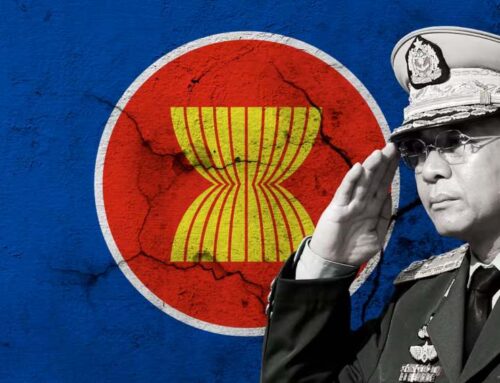Myanmar to allow foreign banks to set up wholly owned operations
{1st Photo Caption: The Myanmar economy is primed for rapid growth.}
Politics Economy
Policy Politics
Myanmar to allow foreign banks to set up wholly owned operations
GWEN ROBINSON, Nikkei senior Asia editor
December 3, 2013 8:00 pm JST
YANGON — Myanmar is moving to allow the first group of foreign banks to set up wholly owned subsidiaries in the country. This could take place as soon as the first quarter of 2014, ahead of the markets’ expectations. Banking regulators are preparing a phased plan under which foreign entities would first be allowed to conduct wholesale banking services for corporate customers and eventually to hold full branch licenses.
Three to five foreign banks will initially be granted licenses to set up wholesale banking operations in Myanmar, with a view to gaining full branch licenses within two or three years, regulators told two small groups of foreign and local bank officials in November. The chosen banks would be required to focus at first on corporate and trade banking. The banks would be permitted to carry out work in areas including project finance, international remittance, and treasury and trade services for local and international companies, the regulators said.
Branch operations would remain off-limits for the time being. The chosen foreign entities, however, would be permitted to sell consumer finance and investment products such as auto loans through local banks. Under current plans, such arrangements would not require local joint ventures, as initially thought.
The move comes far ahead of the expected time frame of one year or more. It highlights Myanmar’s efforts to overhaul a once-closed and semi-socialist financial system, in which exchange rates were heavily manipulated and international banking transactions were strictly limited to a handful of state-backed institutions.
In early 1990s under the military junta, fewer than 12 foreign banks had representative offices in the country. Now nearly 40 foreign banks have opened representative offices, most of them since the reformist president Thein Sein came to power in early 2011. Myanmar this year opened its first ATM machines and allowed international credit card operations, amid government promises to liberalize the financial sector and establish a stock exchange.
Leading Asian institutions have by far the most foreign bank representative offices in Myanmar. They include Singapore’s Overseas-Chinese Banking Corp., Thailand’s Bangkok Bank, Export Import Bank of India, Korea Exchange Bank and Japan’s three megabanks — Sumitomo Mitsui, Mitsubishi UFJ and Mizuho. Among a handful of western banks are Britain’s Standard Chartered and ANZ of Australia.
Japanese institutions were not among the nine foreign banks, and one local bank, represented at the November meeting with local regulators. Some, such as Mizuho, have more recently held private meetings with regulators and pressed the case for Japanese banks to gain licenses. Japanese banks argue that their corporate clients desperately need large scale banking services because they are involved in some of the country’s biggest projects, including power plants and the Thilawa special economic zone near Yangon.
Several foreign banking representatives who spoke with central bank officials about their liberalization plans said they understood the need for phased entry, given local concerns about competition from large foreign banks. They warned, however, there would be “unhappiness” among the many foreign banks that would miss out in the first round of licenses.
Picking up speed
The push for an accelerated timetable for banking liberalization follows changes at the Central Bank of Myanmar, the key finance regulator, which gained more autonomy under a law passed in July by parliament. The central bank’s leadership has since then been reshuffled. Technocrats with western experience have been brought into senior positions.
The first wave of foreign bank licenses will be determined through a tender process, most likely to be run by an outside consultant, according to central bank proposals. The procedure to choose consultants will be similar to one earlier this year through which the government selected two foreign telecommunications companies in a fiercely contested bid for the country’s first two commercial telecoms licenses. That process, won by Telenor of Norway and Ooredoo of Qatar, was run by German consulting company Roland Berger.
To assist the selection of potential foreign bank licensees, the government is likely to narrow the field of consultants in any tender to four or five international professional services companies. Just as in the telecoms tender, the government would create a selection committee to make the final decision from a shortlist compiled by the consultant, a senior financial official who declined to be named told the Nikkei Asian Review. The government will additionally request international financial institutions such as the International Monetary Fund and other organizations to join an oversight committee to advise on terms and help monitor the selection process, the official added.
Even so, the selection process — and the move itself — is likely to provoke criticism in some circles. There are groups within parliament and the business community who fear the impact of competition from foreign investors. Citing the telecoms tender and bids for natural resources contracts, many such critics have accused the government of “selling out” Myanmar to foreign business interests.
Allowing a small handful of foreign banks to commence wholesale operations will help Myanmar fine-tune regulations governing local and foreign institutions before full liberalization. It would also boost the availability of badly needed corporate credit, the senior financial official said. The government would seek an “ideal balance” when considering eligibility to be part of the first wave of banks, the official said, and would include a few leading Asian banks and at least one western bank.
On the legal side, parliament is expected to consider at its next session, in January, a draft law governing financial institutions. The draft bill will set out overall banking rules, but will not detail licensing procedures or criteria for foreign bank entry, one parliamentarian told the NAR. Yangon-based legal experts say the central bank is empowered to grant licenses to foreign banks under the existing legal framework.
The issue of foreign bank entry is particularly sensitive, coming amid rising protectionist sentiment within parliament and among local businesses. Many critics warn that local banks, while benefiting from foreign know-how and banking technology, will be unable to compete. There are 21 private Myanmar banks and four state-owned banks.
Warnings about foreign competition follow protracted battles last year in parliament over the country’s new foreign investment law, and earlier this year, over the telecoms bill.
From the government’s perspective, the move to allow some foreign banks to start operations reflects concerns about the weakness of local banks and the scarcity of credit, particularly of corporate finance, to local and international companies. “Foreign banks will be necessary to help the development of our own banks, and of course to extend credit; we need healthy competition, but we have to be mindful, to protect local banks,” said one government official. While international banks with representative offices in Myanmar can at least provide a point of contact for corporate clients through their Yangon offices, they are barred from providing any banking services inside the country.
The challenge, acknowledged a senior Myanmar financial official, will be to open up to foreign banks and encourage them to bring international financial standards and know-how to Myanmar while safeguarding core interests of local institutions and keeping a close rein on the lending industry.
“Having been restricted for decades, Myanmar’s credit market is now itching to explode, and regulators are rightfully wary,” said Oliver Belfitt-Nash of Ronoc Myanmar, the local arm of an international investment and advisory company. But, he added, the prospect of a “very limited number of licenses for external banks to begin operations would be a favorable course of action” ahead of any legislative change.
Source Link: NIKKEI ASIAN REVIEW





